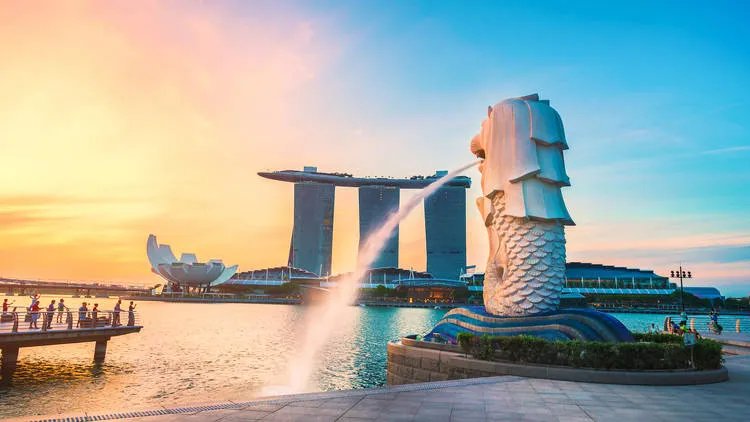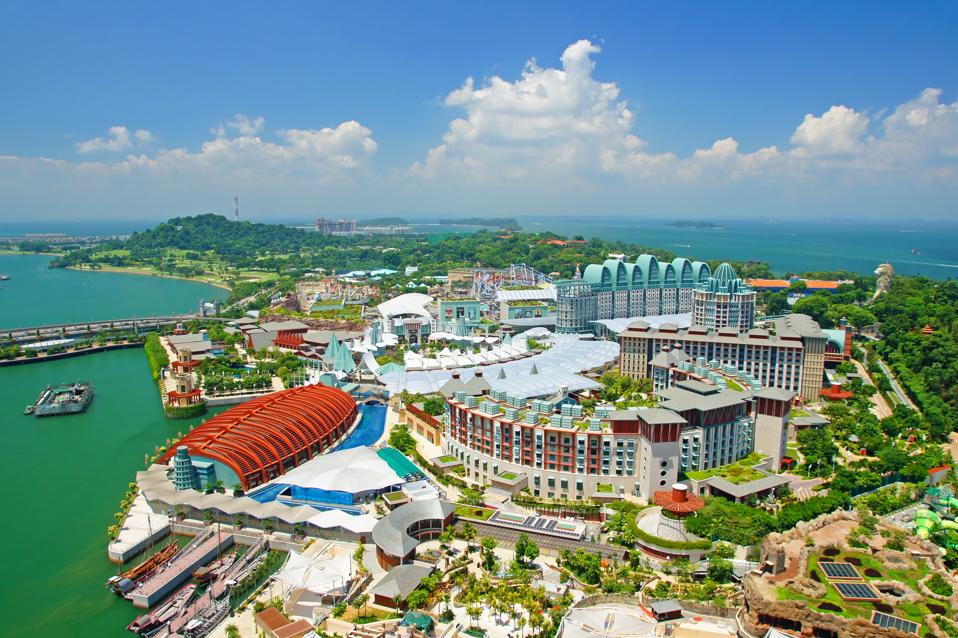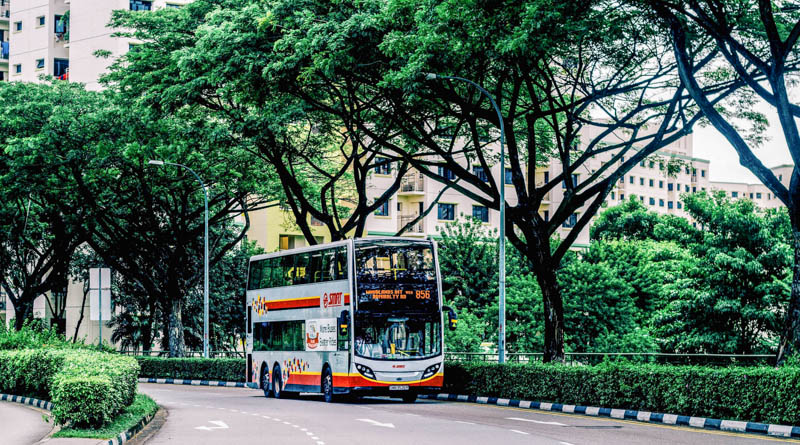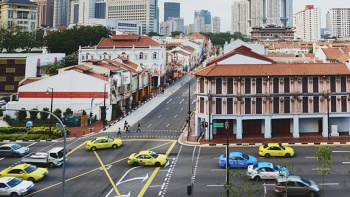About Singapore
Singapore
A virtual travel guide to Singapura; the Malay name for "Lion City". The city-state in Southeast Asia consists of the island of Singapore and about 54 smaller islands. The main island is linked by a causeway to Johor Baru on the southern tip of the Malay Peninsula.
The former British colonial trading post is since its independency in 1965, officially the Republic of Singapore, the city state is situated 137 km (85 mi) north of the equator, and just south of Peninsular Malaysia. In south the Strait of Singapore separates the island from the Riau Archipelago of Indonesia.
Singapore occupies an area of 718 km², compared, it is the smallest state in Southeast Asia, slightly larger then one fourth of Luxembourg or also slightly larger than 3.5 times the size of the District of Columbia, Washington, DC.
The city state has a population of 5.6 million people, and a resident population of 3.9 million (in 2016). Official languages are English (language of administration), Malay, Mandarin, and Tamil.
Singapore is famous for being a global financial center, a shopping paradise, and as a spot for a variety of activities, dining and entertainment.
Source: www.nationasonline.org
The Perfect Host City
Located along the equator in the heart of Southeast Asia, Singapore is at the crossroads of international travel, with 4 billion people within a 7-hour flight radius. It offers visitors an intriguing fusion of many cultures from East and West.
Singapore emerged top in the world for city infrastructure (Mercer 2017). It is amongst the safest cities globally (The Economist Intelligence Unit 2021), and tencon 2024 delegates can expect to walk along the streets late at night without fear. The nation’s general economic prosperity and professional and effective police force contribute to the low crime rate and enable continued success in controlling crime and enhancing personal security. Singapore's safety and political stability have been recognised globally with the following accolades: Singapore retains its lead in business environment rankings. Singapore remains the best place in the world to do business in the next five years, according to EIU's business environment rankings (BERs) for the fourth quarter of 2022. (The Economist Intelligence Unit 2022 Report)
It is a progressive, modern and secular democracy with an excellent racial and religious integration and harmony record. It is an island nation with a multi-ethnic population of about 5.6 million people, primarily Chinese, Malay, and Indian, with English as the primary language of communication.
Singapore is a global hub for business and headquarters for many leading MNCs, including and not limited to financial, medical, technology and scientific companies. It is also renowned for high standards of governance, transparency and efficiency.


Excellent Global Connectivity
The number of visitors to Singapore reached 6.3 million in 2022, exceeding the Singapore Tourism Board's (STB) forecast of between 4 million and 6 million. This was one-third of the number in 2019 before international travel came to a halt in 2020 due to the COVID-19 pandemic. In terms of connectivity and route network, Changi Airport is currently served by more than 80 airlines flying to some 130 cities globally
Singapore Changi Airport has been acclaimed as a leader in efficiency, connectivity, passenger facilities and comfort. Singapore’s Changi Airport has been named World’s Best Airport in 2022 for the 12th year running. Announcements were made at the World Airport Awards at Passenger Terminal EXPO in Amsterdam on 15th March 2023. World’s Best Airport Dining and World’s Best Airport Leisure Amenities were also titles won by Changi Airport. In addition, Jewel Changi Airport offers unparalleled retail and dining experiences for travellers to enjoy before and after their flights.
Singapore is a major air, sea and telecommunications hub in Asia.
Singapore Airlines has consistently been considered among the Top 3 airlines in the past 12 years (Skytrax), and Singapore Airlines was voted the Skytrax World's Best Airline Cabin Crew 2022. The airline also won the first and second positions as the World's Best and World's Cleanest Airlines, respectively, in 2022 Click Here to view more Awards and Accolades won by Changi Airport. Most visitors do not require a visa for visits of a 30-day duration. Those requiring a visa typically process applications in 1 to 3 working days.
Transportation within the city is convenient, efficient, hassle-free and inexpensive.
Many public signages are expressed in English; thus, visitors can easily explore and navigate the city, even on their own. Singapore's public transport system offers an efficient and inexpensive means of getting around for travel between venues. Our iconic landmarks and hottest attractions are also mostly a stone’s throw away from the local stations, making the commute around Singapore convenient. A Singapore Tourist Pass (SGD10) will give you a day of unlimited rides on trains and buses, and almost all the main attractions in Singapore are a short stroll from a station. You can also use your personal credit card to pay for all your rides.
In a recent survey, Singapore's public transit system is ranked fourth in the world after Hong Kong, Zurich and Stockholm and unsurprisingly ranks first in Asia. We have 140 stations across six Mass Rapid Transit (MRT) lines that connect the island, with over three million daily ridership. There are 40 stations across the two Light Rail Transit (LRT) lines, catering to citizens who live slightly further from the main train stations, which also see over 200,000 daily ridership. Our timely buses also boast a fleet of more than 3,400 buses, operating more than 220 bus services, providing convenience even when travelling to the corners of Singapore that are not as accessible by train.
Other factors that make Singapore's public transport system stand out include the convenience of its electronic services. Singapore has also been praised for having one of the most affordable public transport systems, and making public transport more accessible in Singapore has been the long-term goal.Our robust network of public transportation includes the following:
Mass Rapid Transit (MRT)

5.30am – 12am
Fare per trip (USD)
1.30 – 2.45
Fare per trip (SGD)
1.70 – 3.30
Buses

5.30am – 12am
Fare per trip (USD)
1.30 – 2.25
Fare per trip (SGD)
1.70 – 3.00
Taxi

24hours
Fare per trip (USD)
from 2.40
Fare per trip (SGD)
from 3.20
The Mass Rapid Transit (MRT) system is one of the fastest ways to zip around the city, and most of Singapore’s key attractions are within walking distance from an MRT station. Taxis and buses are also widely available.

